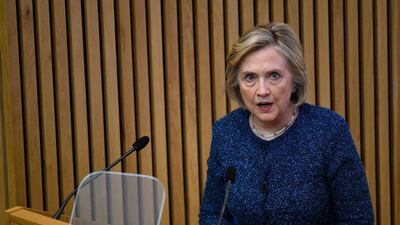Hillary Clinton has condemned totalitarian tools used by US rivals, warning technology companies not to be “complicit” in restricting human rights online.
Speaking at Oxford University on Tuesday, Mrs Clinton said digital rights were now human rights, and called on governments and tech companies to ensure people are protected.
She said China’s use of surveillance and facial recognition technology against its Muslim Uighur population was a “21st-century model of totalitarian oppression”, with credible reports of mass detention, torture and brainwashing in the country’s western Xinjiang region.
“Technology and globalisation were supposed to bind the world closer together, break down the barriers that rulers use to hold their people back and spur on openness, innovation and freedom,” she said.
“We’ve learned the hard way that technology is a double-edged sword, not just carrying democratic values to oppressed people but also giving authoritarians the tools to tighten control and counter-attack at the foundations of open societies.”
Mrs Clinton used China and Russia as examples of internet misuse to curb human rights. Mrs Clinton also talked of China’s "Great Firewall", used to restrict citizens’ access to information and root out dissidents.
“It also bullies foreign tech companies, nations and international organisations alike to accept its vision of an internet divvied up between all-controlling national governments,” she said.
Mrs Clinton called on Google to “refuse to be complicit, regardless of how many advertising dollars are at stake”.
Russia used the internet to “wage cyber warfare” and influence elections and referendums through social media in the US and Europe, Mrs Clinton said.
_______________
Read more:
Lenovo shares tumble as investors fret over impact of Chinese spy chip report
UK plans new strike-back cyber force
_______________
Rogier Creemers, a China expert at Oxford University, recently published a document purporting to show Chinese officials planning a "social credit" system. The State Council document proposed using big data collected on citizens to give them individual scores on their behaviour.
The six-year roll-out plan said every adult should have a social credit code assigned to them by 2020. Mrs Clinton said the system amounted to a “high-tech gulag”.
She also backed lawmakers in the UK in their quest for a full, independent investigation into Russian influence over the Brexit referendum.
“When you add it all up, democracy is in turmoil, autocrats ascendant, a dystopian future taking shape before our eyes, it sounds daunting,” she said.
A solution lay in democracies teaming up against human rights abuses and putting them at the front and centre of interactions with nations like Russia and China who flagrantly disregard them, Mrs Clinton said.
Her ire was not only reserved for Russia and China, however. She criticised Theresa May’s European lawmakers for their refusal to vote for the EU's Article 7 process against Hungary for its undermining of civil rights.
“It’s disheartening to see conservatives in Brussels vote to shield Victor Orban from censure, including British Tories. They’ve come a long way from the party of Churchill and Thatcher,” Ms Clinton said.
Her criticism wasn’t just reserved for foreign nations. The former New York senator attacked President Donald Trump’s policies – including the Muslim travel ban, family separations at the Mexican border and banning transgender Americans from the armed forces – saying they were a threat to human rights.
The wide-ranging speech also praised groups such as Black Lives Matter and the #MeToo movement, as well as Nobel Peace Prize winners Nadia Murad and Denis Mukwege for their activism.


